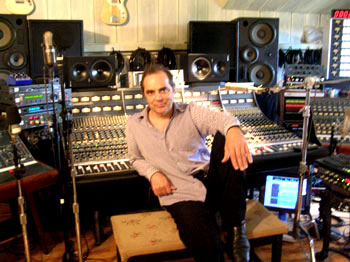|
..:: audio-music dot
info ::..
|
Daniel Lanois
 Deriving their name from the
metric total of semen ejaculated by the average male, the
tongue-in-cheek British art-pop band 10cc comprised an all-star roster
of Manchester-based musicians: vocalist/guitarist Graham Gouldman was a
former member of the Mockingbirds and the author of hits for the
Yardbirds, the Hollies, Herman's Hermits and Jeff Beck;
singer/guitarist Eric Stewart was an alum of Wayne Fontana &
the Mindbenders; and vocalists/multi-instrumentalists Kevin Godley and
Lol Creme were both highly regarded studio players. Formed in 1970,
10cc began as a session unit dubbed Hotlegs; after establishing
residence at Stewart's Strawberry Studios, Hotlegs scored a surprise
U.K. smash with the single "Neanderthal Man," subsequently issuing an
LP, Thinks: School Times and touring with the Moody Blues.
Deriving their name from the
metric total of semen ejaculated by the average male, the
tongue-in-cheek British art-pop band 10cc comprised an all-star roster
of Manchester-based musicians: vocalist/guitarist Graham Gouldman was a
former member of the Mockingbirds and the author of hits for the
Yardbirds, the Hollies, Herman's Hermits and Jeff Beck;
singer/guitarist Eric Stewart was an alum of Wayne Fontana &
the Mindbenders; and vocalists/multi-instrumentalists Kevin Godley and
Lol Creme were both highly regarded studio players. Formed in 1970,
10cc began as a session unit dubbed Hotlegs; after establishing
residence at Stewart's Strawberry Studios, Hotlegs scored a surprise
U.K. smash with the single "Neanderthal Man," subsequently issuing an
LP, Thinks: School Times and touring with the Moody Blues.
After signing to Jonathan King's U.K. label and rechristening
themselves 10cc (a name suggested by King himself), the group backed
Neil Sedaka before recording 1972's "Donna," a sly satire of late-'50s
doo wop. The single reached the number two position on the British
charts, establishing not only a long-running string of major hits, but
also the quartet's fondness for ironic and affectionate reclamations of
musty pop styles. The follow-up, "Rubber Bullets," topped the charts in
1973, and both the subsequent single "The Dean and I" (a nostalgic look
at academia recalling Jerry Lee Lewis' "High School Confidential") and
an eponymously titled debut LP further solidified 10cc as a major force
in British pop.
While 1974's Sheet Music and singles, including the Brian
Wilson-esque "Wall Street Shuffle," "Silly Love" and "Life Is a
Minestrone" continued 10cc's dominance of the U.K. charts, they found
the American market virtually impenetrable prior to the release of
1975's "I'm Not in Love," which topped the charts at home and climbed
as high as number two in the States. After 1975's Original Soundtrack
and the next year's How Dare You!, Godley and Creme exited to focus on
video production as well as developing the Gizmo, a guitar modification
device the duo invented. In the wake of their departure, Gouldman and
Stewart continued on alone, enlisting the aid of session men to record
1977's Deceptive Bends, highlighted by the perennial "The Things We Do
for Love."
Acadie (Opal Records, 1989)
 Deriving their name from the
metric total of semen ejaculated by the average male, the
tongue-in-cheek British art-pop band 10cc comprised an all-star roster
of Manchester-based musicians: vocalist/guitarist Graham Gouldman was a
former member of the Mockingbirds and the author of hits for the
Yardbirds, the Hollies, Herman's Hermits and Jeff Beck;
singer/guitarist Eric Stewart was an alum of Wayne Fontana &
the Mindbenders; and vocalists/multi-instrumentalists Kevin Godley and
Lol Creme were both highly regarded studio players. Formed in 1970,
10cc began as a session unit dubbed Hotlegs; after establishing
residence at Stewart's Strawberry Studios, Hotlegs scored a surprise
U.K. smash with the single "Neanderthal Man," subsequently issuing an
LP, Thinks: School Times and touring with the Moody Blues.
Deriving their name from the
metric total of semen ejaculated by the average male, the
tongue-in-cheek British art-pop band 10cc comprised an all-star roster
of Manchester-based musicians: vocalist/guitarist Graham Gouldman was a
former member of the Mockingbirds and the author of hits for the
Yardbirds, the Hollies, Herman's Hermits and Jeff Beck;
singer/guitarist Eric Stewart was an alum of Wayne Fontana &
the Mindbenders; and vocalists/multi-instrumentalists Kevin Godley and
Lol Creme were both highly regarded studio players. Formed in 1970,
10cc began as a session unit dubbed Hotlegs; after establishing
residence at Stewart's Strawberry Studios, Hotlegs scored a surprise
U.K. smash with the single "Neanderthal Man," subsequently issuing an
LP, Thinks: School Times and touring with the Moody Blues.